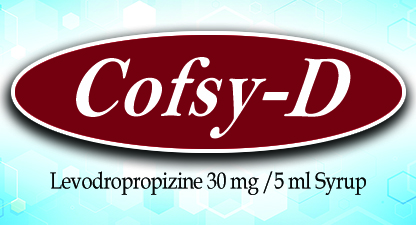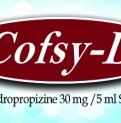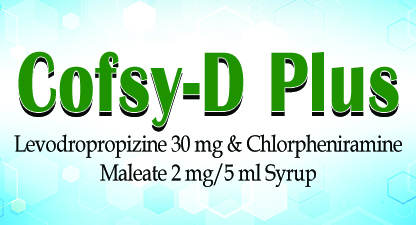COFSY-D
Levodropropizine is a cough suppressant. It is the levo isomer of dropropizine. It acts as a peripheral antitussive, with no action in the central nervous system.
- Categories : Anti-Tussive
- Share Now :
When COUGH creates trouble in life…..
COFSY-D
Generic Name: Levodropropizine
Therapeutic Category: Antitussive
Pharmacological Class: Cough Suppressant
Composition: Each 5 ml contains Levodropropizine BP 30 mg.
Pregnancy Category: D
Presentation: 100 ml bottle with a measuring cap
Mechanism of Action
It reduces cough by:
- Peripheral anti-tussive drugs act on chemical and mechanical receptors mainly located in the larynx and trachea lacking effects on the central nervous system, which make them more tolerable.
- Interfering with stimulus activation of peripheral endings of sensory nerves.
- Acts as a peripheral antitussive, with no action in the CNS
- Does not cause side effects such as constipation or respiratory depression which can be produced by opioid antitussives such as codeine and its derivatives.
Indications
- Dry irritating cough
Dosage
Route of administration: Oral
As a cough suppressant (Adults): 60 mg of COFSY-D, thrice daily. The duration should not exceed more than seven days.
As a cough suppressant (Pediatrics):
For children >2 years: 1 mg/kg, thrice daily.
For children >12 years: consider administration of 60 mg of COFSY-D, thrice daily.
The duration should not exceed more than seven days.
Pharmacokinetics
Absorption: Rapidly absorbed in GIT
Protein binding: Approximately 11-14%
Route of elimination: Renal
Adverse Effects
The symptomatic adverse reactions produced by COFSY-D are more or less tolerable. These include:
Weakness, Dizziness, Headache, Drowsiness, Fatigue, Nausea, Vomiting, Diarrhea, Palpitation, Heart burn, dizziness, Weakness.
Contraindications
COFSY-D is contraindicated in the following situations:
- Excessive mucus discharge and limited muco-ciliary function.
- Severe liver impairment.
- Should not be given in pregnant and lactating mothers
Interactions
- May interact with alcohols, sedatives, hypnotics and anti-histamines.




